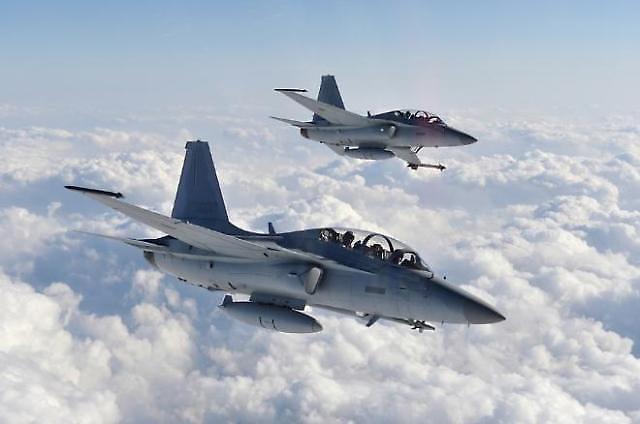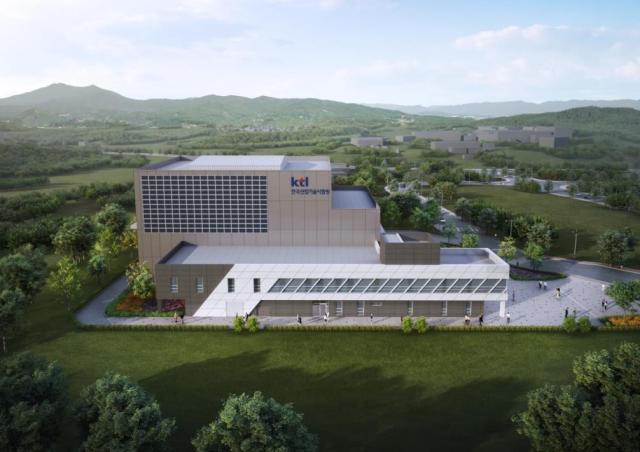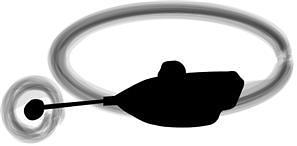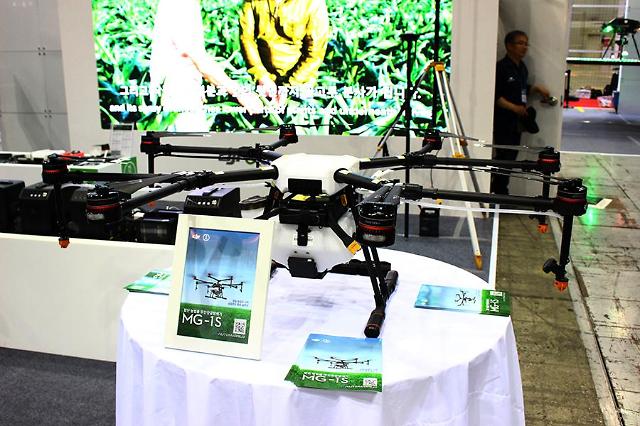
An agricultural drone made by a Chinese company DJI is displayed at the RoboUniverse & K-Drone EXPO. [Park Sae-jin = swatchsjp@ajunews.com]
The buzzing sound of small drones filled the air in an exhibition hall, flying over dozens of booths displaying larger flying objects of exotic shape that could be used for farming and other purposes.
The booth used by China's DJI, the world's largest drone producer, was much larger and more popular than those run by any other South Korean contenders, reflecting its growing popularity among South Korean fans.
"Our drones are best sellers in South Korea. They are cheaper and easy to keep maintenance than other agricultural drones," Kim Tae-chon, a head director in charge of DJI's distribution unit, told Aju News in an interview on June 30, the final day of a three-day exhibition at a KINTEX Hall in Ilsan northwest of Seoul.
The event titled "Virtual Reality SUMMIT" and "RoboUniverse & K Drone Conference & EXPO" drew more than 60 drone producers and VR-related companies. The DJI booth was packed with visitors making inquiries about commercial drones. Some were seen waiting patiently in a queue to clinch a chance of talking with managers.
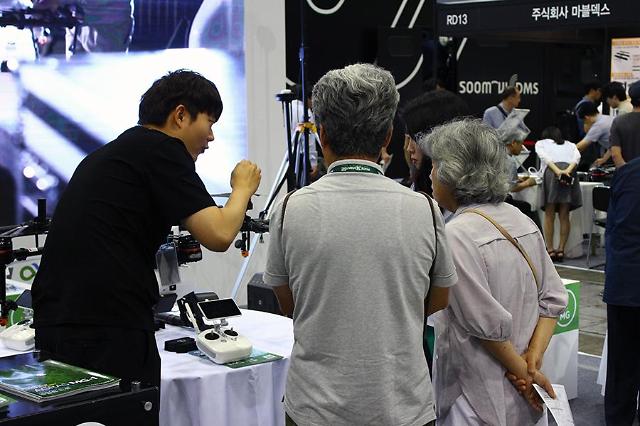
A manager at DJI's booth is answering to visitors' questions about the company's agricultural drones. [Park Sae-jin = swatchsjp@ajunews.com]
"We also provide our customers with our own drone software, which most other companies don't," Kim said in a confident manner.
Along with virtual reality (VR), artificial intelligence (AI) and autonomous driving, drones are considered a vital element in the Fourth Industrial Revolution, but South Korean drones still lag far behind Chinese products led by DJI which takes up 70 percent of the world's commercial drone market.
Headquartered in the southern Chinese city of Shenzhen, DJI is also a market leader at home with a 52 percent market share in 2016. Analysts attribute the success of Chinese drones to full state support.
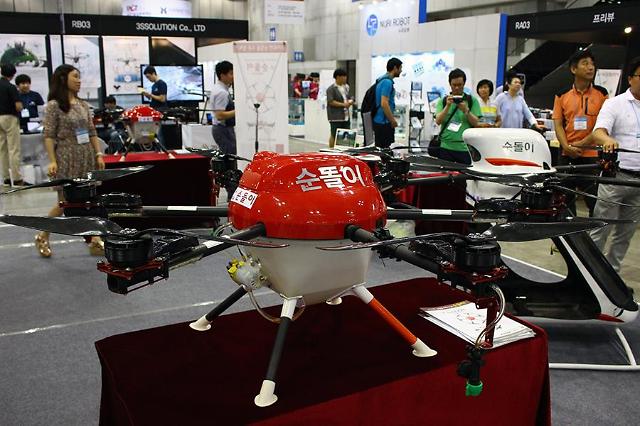
An agricultural drone company E7's booth is attracting visitors of the RoboUniverse & K-Drone EXPO with high-tech drones. [Park Sae-jin = swatchsjp@ajunews.com]
For South Korean drones, government support has been a long way off by far due to tight restrictions prompted by a cross-border military standoff. North Korea has sent spy drones a drone across the heavily guarded inter-Korean border to spy on military and other sensitive facilities.
"Our situation is very different," Jo Soon-sik, CEO and chief engineer of agricultural drone company E7, a South Korean producer of agricultural drones, grunted, blessing out government intervention and regulations that ban the flight of drones at night and at an altitude of more than 150 meters.
Jo, who had worked as an aviation engineer for 25 years, complained about a structural shortage of investments in South Korea's drone industry: "Thanks to full government support, the Chinese do not hesitate to invest in the industry."
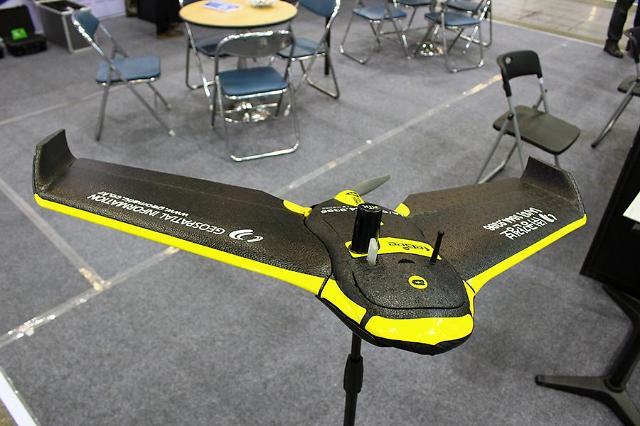
A drone specialized in taking aerial photographs is displayed at the RoboUniverse & K-Drone EXPO. [Park Sae-jin = swatchsjp@ajunews.com]
Chinese colleges provide technical help in developing software and hardware, according to a report released by the Korea Institute for International Trade (KITA) in May this year.
The Chinese government has eased regulations related to the development and operation of drones, while recreational users in South Korea cannot fly drones in most capital areas and other populated cities.
"Ironically, key DJI members visited South Korea ten years ago to learn about drone technology. Now, our technologies are far behind," Jo said, speaking about a shortage of investments. "Who's going to invest in an industry regulated by its government? Only a fool would do that."
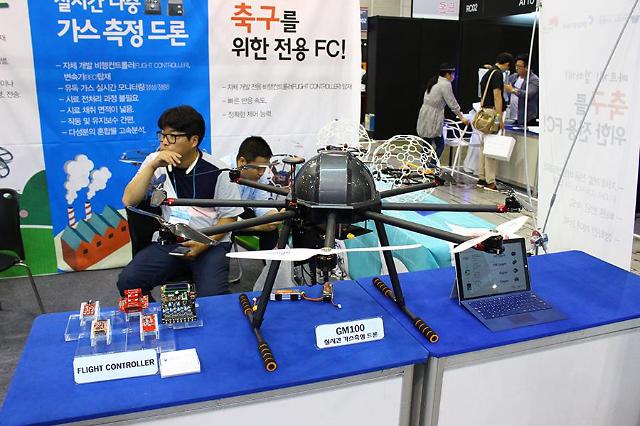
WOORI AVIATION's drone can detect multiple types of gas in the air in real-time using infra-red and laser technology. [Park Sae-jin = swatchsjp@ajunews.com]
The domestic drone industry has fallen back to a point where the companies put assembled drones out with parts and software coming from China. So some companies with no key technologies turn to agricultural and industrial drones in a desperate bid to keep their originality.
WOORI AVIATION targets the overseas market as its drone can detect multiple types of gas in the air, using infra-red and laser to prevent accidental explosion at industrial plants and mines.
"We've developed a gas detecting drone for the first time in the world," said Woori president Park Sun-kie. "We chose to look outward. We are currently in talks with a government in Northern Europe."
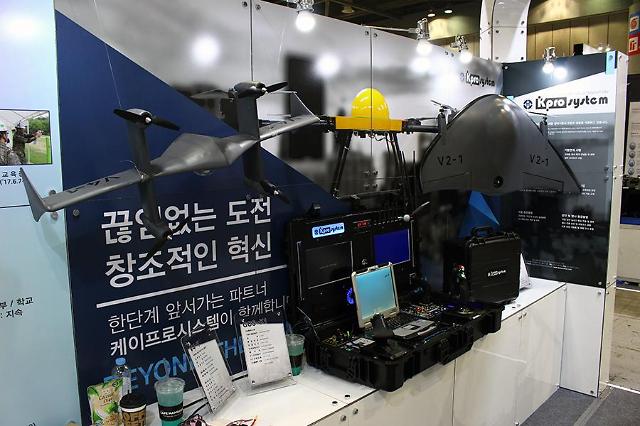
Various types of military drones are displayed at the RoboUniverse & K-Drone EXPO. [Park Sae-jin = swatchsjp@ajunews.com]
Others are trying to survive by developing more specialized drones. "South Korean weapons are selling well abroad. I believe our military drones have a chance in the international market," said Kim Jun-yon, president of KPRO-SYSTEM, which teach army drone academy officers on how to operate drones.
Park Sae-jin = swatchsjp@ajunews.com


